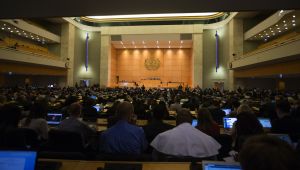Could NATO's current bombing campaign against Serbia lead to deadly conflict between the United States and Russian military forces? Until last week, my answer was a categorical no. But then I went to Moscow.
The primary reason for my trip was to speak to a conference of 6,000 participants from across Russia about mortgages and housing. For the past 18 months, a Harvard project I head has been providing technical assistance to Moscow's Mayor Yuri Luzhkov and his Moscow Mortgage Initiative.
After my presentation, Mayor Luzhkov asked that I come see him that evening. We discussed Moscow's progress in developing a market-based mortgage system. We assessed Russian macroeconomic policies. As I prepared to leave, he changed the subject.
"Is the American government thinking carefully about the consequences of its decisions in Kosovo?" he asked. To him, the United States appeared surprised by the not unlikely consequences of its actions: Milosevic's reaction to Rambouillet, dismissal of the threats of bombing, defiance of the bombing campaign, increased support from the Serbian people, and ferocious attack on the KLA and atrocities that created the flood of refugees to Albania and Macedonia.
"Are American policy makers analyzing carefully scenarios from the current situation to the end of this story?" he asked. "Specifically, have they considered the possibility that intensifying pressures of public opinion in Russia as well as the United States could create domestic dynamics that lead to direct military conflict between the US and Russia?"
I responded that the foreign policy community was trying to analyze all scenarios. I noted President Yeltsin's warning about such a danger but discounted it as "noise." I said that I had never seen a credible scenario for such a catastrophic conclusion and offered a judgment that such an outcome was almost inconceivable.
"If the bombing fails, as it appears likely to do, could NATO launch a ground invasion to liberate Kosovo?" he asked. I agreed that it was quite possible. "In that case, what would Russia do?"
He reiterated his condemnation of Milosevic and his barbarism. He identified no significant national interest in Serbia. He has opposed Communist-sponsored proposals for security guarantees to Serbia or even confederation. He reaffirmed his belief that Russia should not become involved in this war.
"But if NATO ground forces began invading Serbia," he asked, "could the Russian government maintain the embargo on the supply of arms to Serbia?" Unlikely, in his view. Russian arms, perhaps including S-300 surface-to-air missiles capable of shooting down US aircraft, would be supplied to Serbia.
By what route? The mayor noted last week a convoy of military vehicles, fuel, and humanitarian assistance to Serbia that had been stopped by the Hungarian government at its border. Hungary would undoubtedly deny ground shipments of arms to Serbia.
"What would Russia do then?" he asked. "Could it not deliver arms by air transport? The United States took that route in supplying Berlin during the blockade of 1948." Would NATO allow Russian aircraft to violate Hungarian airspace and deliver arms to Serbia? Or would they choose to shoot down Russian planes instead?
"If NATO were to shoot down Russian planes, how would Russia respond? Would Russia stand down? Or would Russia retaliate by attacking NATO aircraft, or the bases from which NATO aircraft that shot down Russian airplanes had flown?" Russia could, of course, do this with non-nuclear missiles, he said.
This conversation went on into the night. Throughout, the mayor was not threatening but analytic. In his view, allowing mad momentum to push politics to such an end would be "crazy." He recalled the logic of Greek tragedy in which the actors are moved by a compelling, self-destructive dynamic to results they would never have chosen rationally. Remember 1914.
As I left the mayor's office I thought back to an uncomfortable historical analogy. In the Cuban missile crisis of October 1962, US and Soviet leaders stood "eyeball to eyeball," each with the unilateral power of mutual annihilation in hand. On the final Saturday of that crisis, a Soviet surface-to-air missile in Cuba shot down an American U-2 aircraft, killing its pilot. The Kennedy administration had considered that scenario and prepared its response. It would retaliate by bombing Soviet SAM sites in Cuba - an action that in their estimate would have killed at least scores of Soviet soldiers.
At this brink, President Kennedy paused. That evening, before proceeding with the retaliatory attack, he undertook an extraordinary initiative to provide Khrushchev an escape, including significant concessions - sufficient to persuade Khrushchev to withdraw Soviet missiles without war.
Even at this late date, after Milosevic's atrocities and four weeks of steady NATO bombing, it may not be too late to pause for a serious strategic reassessment of the path along which we are now being driven.
Graham Allison is director of Harvard's Belfer Center for Science and International Affairs.
Allison, Graham. “Could the US and Russia Wind up at War?.” The Boston Globe, April 25, 1999




